Right Way To Open a Home Health Agency in 2024 – Best [FREE] Guide
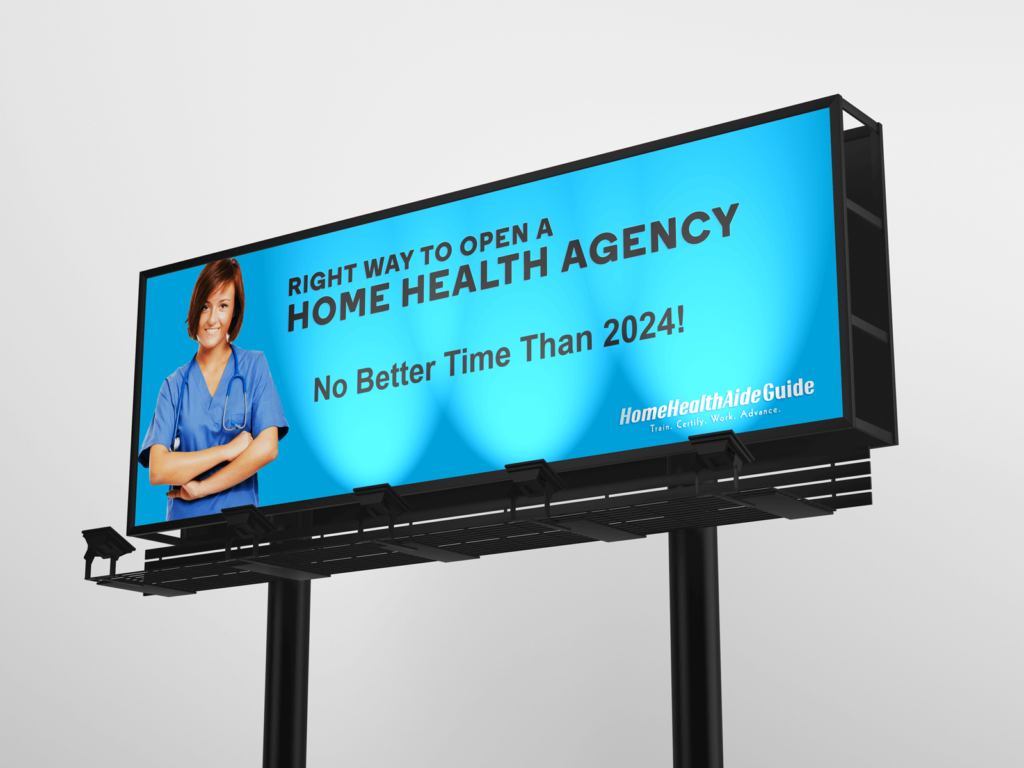
Introduction
Starting a home health agency in 2024 offers a significant opportunity, responding to the growing demand for in-home care in . This industry expansion, accelerated by post-COVID-19 preferences, caters to many who choose to age comfortably at home rather than in institutional settings.
However, launching such an agency requires careful planning, resources, and specific personal traits like compassion and dedication. This guide will navigate the essentials of establishing a successful home health agency, addressing industry trends, financial planning, licensing, and staffing needs to help you create a fulfilling and viable business.
If you are a sincere and compassionate individual with a knack for helping others, you may want to consider starting a home care/health agency.
Why Start a Home Health Agency Now?
The aging U.S. population, with around 10,000 people turning 65 daily, is significantly influencing the demand for home care services. By 2025, this demographic is expected to reach approximately 72 million.
Most people, over 90%, express a preference for aging at home rather than in institutional settings, making home care a more cost-effective option compared to nursing homes. This preference is also supported by healthcare payers like Medicare and Medicaid due to lower costs. The average nursing home costs between $75,000 to $90,000 annually, while home care ranges from $10,000 to $35,000. The demand for home health services has surged post-COVID-19, highlighting the risks and emotional challenges associated with nursing homes. This trend underlines a growing market opportunity for home care businesses.
Imagine sending a senior family member to such a facility?
Right, no one can.

This has created a booming business in home care.
Consider building a home care agency. Why not take advantage of this opportunity?
Not a doctor? Not a nurse? Don’t worry… a medical background is not required for a home care agency.
Setting up the enterprise is very similar to setting up most of the other businesses in the country. The only major difference is the licensing and varying approval which are detailed below.
SHORT STORY?
With the aging population on the rise you may want to consider setting up a home care agency in .
5 Reasons to Start a Home Health Care Business
How much can you make owning a home health agency?
Wondering what your home health care business income will look like, once you have gotten off the ground?
The national average rate for at-home non medical care is about $27 / hour so as long as it’s in line with other companies charging this amount then there should be potential to make up between $50k – $100K annually depending on how well priced out of market pricing can get.
COVID-19 Impact On The Industry
What have we learned about the pandemic?
Aside from the devastating toll on lives, it created demands on our health care system that we never experienced. And not just those with the virus but the entire [world] population.
More telling, is that it was highly transmittable spread through skilled nursing facilities like wildfire; many have have died from COVID that probably could have been avoided.
Even with the vaccines and boosters, more family members will seek out home care in 2024 in order to keep a loved one out of harms way.
Home Care vs Home Health Care
Home care vs. home health care sound similar, and in some ways are, but in many ways are not.
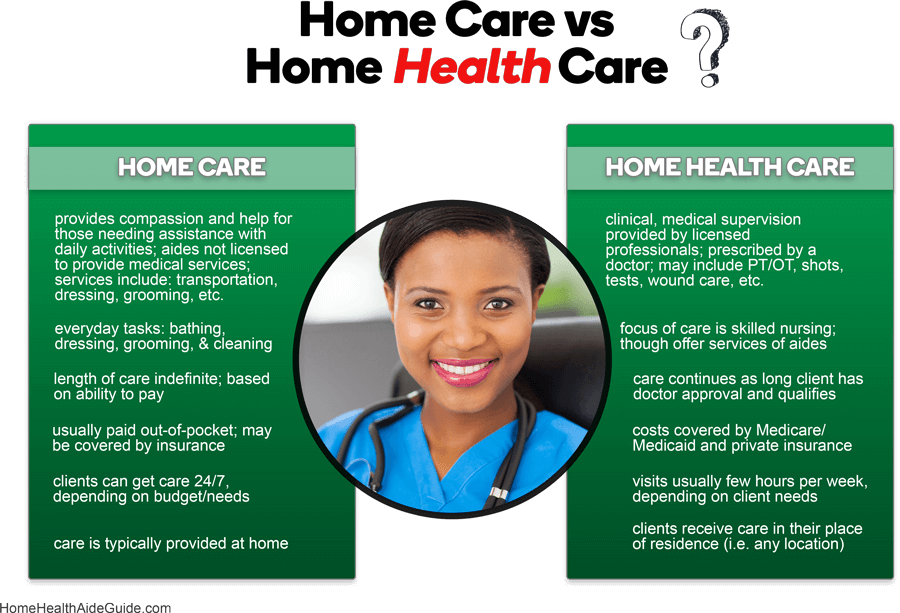
Home Care
These are non-medical and usually associated with companionship and assistance with activities of daily living (ADL). Services of this type do not require authorization or approval from a physician. Most often, these are paid for out-of-pocket (i.e. private pay) but can also be covered through a long-term care insurance policy.
Aides can provide bed baths, housekeeping, help with getting dressed, meal preparation as well as transportation.
Home care professionals are generally not able to administer medications or change dressings.
Services also include options, such as:
- companionship
- medication reminders (most states do not allow aides to administer)
- light housekeeping
- grocery shopping and meal preparation
- assistance with getting dressed
- quick errands
- basic hygiene and toileting
If you are looking to provide services such as personal care, assistance with daily living, companion care, light housekeeping, or nearly any other services that do not require skilled nursing or therapy, then you are starting a home care agency business.
The need for more home care agency businesses is greater now more than ever. Our population is aging, and our seniors need to be cared for. Most families and seniors would prefer for this care to take place in their home.
Starting a home care agency business is not only spiritually rewarding, but it can be very profitable as well. We own three home care agency businesses of our very own and have helped hundreds of people just like you start their home care agency businesses.
Home Health Care
Home health care always refers to medical skilled services.
These require pre-authorization from a doctor. Services may be applied to someone recovering from surgery though most typically an older person. These patients need extra support at home in order to make them comfortable. Services of this nature are most often paid for by Medicaid.
What is a “Home Health Agency”?
Home health agencies are able to deliver licensed and certified nursing, physical therapy, rehabilitation, and other skilled medical care to their patients, usually under physician’s orders.
These agencies have strict licensing requirements, as they are providing professional medical care, and often require Medicare and Medicaid certifications.
A home health care agency business can also offer non-medical services but can also offer medical/skilled nursing services as well as OT, PT, and ST services. Starting a home health care business will require Medicare accreditation if your home health care agency businesses wishes to be reimbursed by Medicare and most 3rd party payers such as Medicaid and private insurance companies.
Both home care and home health care can be essential for the psychological well-being of the elderly person receiving it, as assisted living homes and hospitals can be a strain on any person.
From the Ground Up or Existing?
It’s time to focus on opening or starting such a business.
There are many factors to consider but the very first one is: do you buy an existing business, start one from scratch or consider a franchise? There are many pros and cons of each; please explore all your options.
But an Existing Home Health Agency
When you buy an existing agency, everything is already in place. This means you’ll spend less time getting it up and running. Existing agencies already have customers – hopefully…
You must ask tons of questions and dig deep when considering an existing home health agency to buy. Why are they selling? Can your accountant look at the finances? Is there a lease? Are they taking the clients to another business?
They will be a hundred questions you need to ask. You need to surround yourself with professionals who know how to decipher whether to make an offer or walk away.
Start and Agency from Scratch
You want to be your own boss and have the say in every decision? Then starting from nothing, so to speak, is the best opportunity for you.
This doesn’t mean it’s any easier than a franchise or buying an existing agency. It will be different and a matter of personal preference. It may not be any cheaper as there are many variables.
It is best to hire a consultant to help you. One wrong decision may cost you time and lots of money. There are companies that do just that: advise owners of home health agencies. It’s worth looking into.
You can start small and at your own pace. Follow the steps below starting with a business plan.
There are companies that specialize in providing the services, products and software you may need to start an agency. For example, industry-specific scheduling software, templates for forms and policies, human resource assistance, etc.
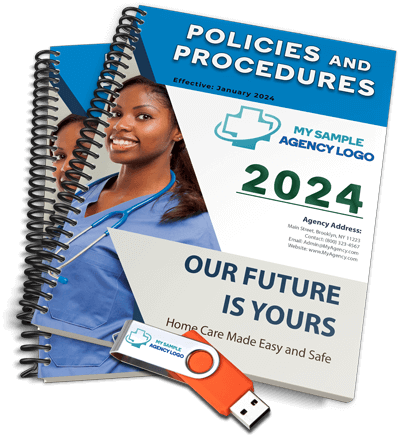
NEW FOR 2024
150+ Policies and Procedures! Customized for FREE with YOUR agency information!
You will need these forms BEFORE you open an agency; avoid very costly mistakes and save thousands of dollars! Access your very own home health care agency policy and procedure manual. Add your logo, name, address etc. all for FREE!
PLUS we just added a new ** Agency Employee Handbook **!
Since the industry is booming, very smart folks have started companies to help folks start a business such as this. They come at a cost but cutting corners when creating a business can be deadly.
One aspect you will definitely need help is the licensing and permits; they vary by state and can be tricky.
The pros and cons outlined on the many ways to start your own agency is only the first of many steps to opening on day one and sending out your home health aides to see clients.

It can make all the difference in your success. Do your research and compare the options.
Franchise Opportunity
Opening a franchise home health agency may offer be appealing. They appear simpler on the surface and need less heavy lifting on your part (you are the “franchisee”).
Investing in a franchise agency means that you’re given the tools to operate the agency. The “model” has been developed by professionals and you piggyback on what they have implemented. The brand has already been established.
Getting the approvals and licenses is much easier and all the policies and procedures have been developed as well.
Opening a franchise always requires investing money upfront and this can range from $50,000 to $250,000 – quite a swing. As a franchisee you are limited how you can operate your business: you must adhere to corporate policies and procedures. And if you break any rules you may lose your business altogether.
For example, let’s say the company runs into financial trouble or reputational risk and is forced to close – you may lose your business as well. You are at the mercy of your parent company. They fail and you fail.
Franchising Pros
Franchising Cons
The Necessary Steps to Starting Your Home Health Care Agency
Step 1: Your Business Plan

 How much can you make owning a home health agency?
How much can you make owning a home health agency?
Home health care may be unique, but the one thing it has in common with every other new business venture is that a lack of planning is a sure way to undercut its potential success.
Your business may never get off the ground without a realistic and conservative plan.
Every detail, no matter how painful, must be identified and addressed.

Things you never thought could happen may find a way of impacting your business. For example, did you ever think there would be a shortage masks and other personal protective equipment (PPE) from a pandemic? Right, no one did.
Could you have planned for that? Perhaps. Having enough of a cash reserve would help you procure some of that inventory at a higher cost. Or building up on supplies.
Good business sense, at this and every step along the way, is more valuable than medical or clinical expertise. Once you get up and running you will be amazed how many home health care owner/operators have no medical background but are very strong managers and leaders.
What to include in your business plan?
Having writer’s block? Get going and start to pencil it all down.
You will revise this dozens of times and even more as others review it. This is the foundation of your new agency.
Equipment and starting expenses
Financing and cash flow
All of the above will add up very quickly and this will be an expensive venture – don’t kid yourself when it comes to forecasting expenses.
 You will need to find a way to finance all this. Raising capital most likely means bank loans, small business loans, and family/friends. There may be state and city grants (if the city is large enough) toward small business. Minority or women owned business loans may be an option as well.
You will need to find a way to finance all this. Raising capital most likely means bank loans, small business loans, and family/friends. There may be state and city grants (if the city is large enough) toward small business. Minority or women owned business loans may be an option as well.
For sure you will be operating at a loss (i.e. expenses are greater than revenue) for the first six month to a year. That’s OK. As long as you plan for it and it’s incorporated into your cash flow forecast.
Your client base needs to grow and you need to be on a regular reimbursement schedule for Medicare and Medicaid. A carefully thought out cash flow management plan is required to ensure you can get through these key first few months. It’s all in the planning.
Sample budget for a home health agency
Your home health agency budget should estimate your initial costs, such as registering the business and obtaining equipment. Your estimated expenses should also include hiring registered nurses or aides (skilled professionals) and renting office space for staff; factor in added expenses for protective gear as a result of COVID-19, utilities, etc.
After organizing all this information on an annual basis versus monthly – make sure there’s enough leeway built into future months so that unexpected events won’t throw off total numbers too much when calculated together at year end.
The True Cost of Starting a Home Health Agency – FREE Analysis and Download!
Cash is king in starting and running an agency. As you get going you want enough cash flowing in so there are no disruptions in paying expenses – one missed payroll and you’re out of business.
Healthcare agencies need to register/license their business in order for it be legally recognized and operated. This will help the agency maintain its status as an official representative of those who require assistance with daily life activities such as healthcare needs, so make sure you take care when choosing what kind or entity type (incorporated vs unincorporated) that best suits your circumstances.
Make sure you are prepared for the needs of your business as it grows. For example, if you plan on hiring employees in order to take care of clients more efficiently and effectively than before then consider how this might affect their payroll with taxes taken out monthly or weekly depending upon what’s best suited given individual employee circumstances such that there is minimal disruption.
Likewise when looking into using contractors versus full time staff members (especially those who may not have healthcare benefits through employment) such as personal care aides and home health aides, keep these important factors under consideration for tax reporting.
The key to breaking even in a business isn’t just about the revenue you receive from customers; it’s also important that your expenses are covered. To do this, calculate how much sales will generate and make sure there is enough left over for regular costs like rent or insurance before expanding into medical services if they’re not already offered yet!

See Your Budget!
Our free agency budget tool will allow you to see within minutes how much money you will need to start an agency in 2024.
Market research and your competitive landscape
Your market research will entail collecting, analyzing and interpreting information about your market – or where you will conduct your business. You would not want to start hiring home health aides for a market that has an agency on every block!

The information could be about clients, competitors and the industry as a whole. This is the foundation of any successful company. The research has a number of different purposes – from identifying your new agency and perhaps even expanding to more than one location!
Here’s how you can use your market research:
A strong competitive or market analysis will help direct you with marketing and recruitment strategies when you identify where others have fallen short.
Step 2: State and Medicare/Medicaid certification

License and Registration of a Home Care Agency
 The certification process starts with the state in which you will be operating.
The certification process starts with the state in which you will be operating.
Home health care agencies are regulated by state and federal laws and often are Medicare and Medicaid certified.
Licensing varies by state but there are three common components:
- proof of agency authorization
- criminal checks
- proof that key staff members are qualified under state regulations
There are fourteen (14) states that do not accept license applications unless it can be proven through a Certificate of Need (CON) application that the need for a home health care agency is pressing. Simply put, it is a way states aim to reduce health and medical costs.

NEW FOR 2024
150+ Policies and Procedures! Customized for FREE with YOUR agency information!
You will need these forms BEFORE you open an agency; avoid very costly mistakes and save thousands of dollars! Access your very own home health care agency policy and procedure manual. Add your logo, name, address etc. all for FREE!
PLUS we just added a new ** Agency Employee Handbook **!
More than thirty (30) states allow the establishment of a new home health care agency without a Certificate of Need Application. All but four (Iowa, Michigan, Massachusetts and Ohio) require the submission of a state license application.
Besides, your new home health care agency can be subject to inspections on a one-year, two-year or three-year cycle by authorized representatives of the state’s department of health. These may unannounced.
Medicare and Medicaid
To receive payment from Medicare and Medicaid, your agency needs to meet very specific requirements put in place.
You will need to incorporate your business, get a tax identification and register for your NPI (National Provider Identification) number. Requirements vary by state – see below for a full listing on state contacts.
Unless you have an unusual agency model (?), Medicare and Medicaid will be your primary sources of revenue. It is important that your business obtains all the proper Medicare and Medicaid certifications.
Medicare accreditation:
To complete the process of Medicare accreditation, you must complete a three-day Medicare survey. This is a review of your business’s operations and patient records. This can be a lengthy process.
Some states require a new home health business to complete a state jurisprudence exam before granting a license to operate, so be sure to do additional research for your own state.
Step 3: Staffing and Management of the Agency

 You will have supplies as part of your inventory such as masks, wipes, first aid kit, sanitary personal protective equipment, etc. but your number one product is your staff.
You will have supplies as part of your inventory such as masks, wipes, first aid kit, sanitary personal protective equipment, etc. but your number one product is your staff.
They are the ones that provide the service to your client/patient base. And the ones who are the source of your revenue!
The best way to get and retain clients is to have a first-class reputation of providing top-quality professional home health care. The registered nurse (RN) and home health aides (HHA) under your umbrella are the face of your agency – they will, for the most part, determine a favorable or unfavorable client experience.
You need to find the best talent you can – and that may come at a premium. The competition is fierce for topknot talent. And this may be your toughest challenge.
Competing agencies are offering signing bonuses of $500 to home health aides nowadays and these will increase in 2024. Good talent is tough to come by.
Agency Staffing Basics
In The Field
Nurses and home health aides comprise the majority of the personnel who will be providing services and treatment to your clients. There may be physical and occupational therapists, too. These folks are (should be!) highly trained and licensed.
They are responsible for all client care and have constant contact with patients and their families.
It can’t be stressed enough that if you cut corners getting high quality medical professionals your business will suffer. Besides, you will never get any sleep. You need to be able to trust these folks implicitly.
For the staffing of home health aides, you can go about it a couple of ways.
Hire and train the aides and keep them on staff as employees. As you are first starting out this may be a significant drain on your cash. Many established home health care agencies offer free training to candidates on the condition they work at the agency for a six-month period.
Another option is to work with an employment agency near you who can provide, on a contract bases, the home health aides you will need; the staffing will be determined by your workflow. You’ll want to work with an agency that deals exclusively with medical professional as they have the expertise.
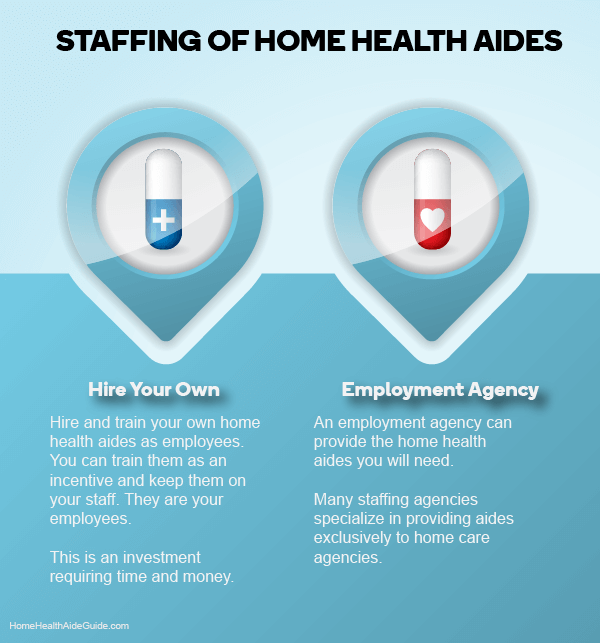
Support Staff
The support staff makes sure your agency runs as efficiently and profitable as possible. There should be a human resource professional, receptionist, medical billing and coding member and an information technology person.
You don’t need all these folks on day one… as folks may wear many hats assuming extra responsibilities as you get going and building the business. Make sure there is strong leadership to monitor quality control in all these “departments”. One slip-up and your reputation may be tarnished – or worse, a client’s health is jeopardized.
Medical Supervision
The most senior medical person on your staff is usually the head nurse, or often referred to as the quality assurance nurse or director of nursing. He/she supervises all the caregivers (i.e. aides) and the scheduling of client visits. There may be a nurse reporting to this person who handles the clinical aspects. The structure of your medical staff (i.e. nurses) varies.
Management
As the owner (even if the agency is a franchise) you are the administrator, running the entire enterprise. You will ensure the ongoing viability of the agency.
(As your agency builds and gets off the ground you may eventually be filling the role of nursing administrator; he/she is highly educated with a degree in business or, preferably, master of health care administration. This person knows the policies and procedure in her sleep.)
While many of the details will be the responsibility of your staff, it all funnels up to you.
Soon, you will see the value of hiring the best of the best! Under your watch all licensing, marketing inspections, and client/family issues are under your umbrella.
P.S. Some states require a certified administrator to be at the helm.
Background Checks
One last thing about your staff. Conduct background checks for all your hires. This doesn’t mean Googling their name…these need to be thorough and professional. Looking to avoid a disaster of any size? Have these done by a professional background checking firm.
Further, background checks are mandatory for home health aides.
Step 4: Marketing strategy and plan

 It’s difficult to name the most crucial of the steps to starting your home health agency. And within each of these there are dozens of other steps.
It’s difficult to name the most crucial of the steps to starting your home health agency. And within each of these there are dozens of other steps.
You’re in business to make money, right?
Customers generate revenue (aka sales) and your number one way of doing so is building your client base.
A marketing strategy is outlining how you are going to sell your home health services. Getting clients and building your business – this is how and why you build your marketing plan and fine tune it.
Pretty much like any business: you need [paying] customers. Quite simple, right?
Outlining Your Marketing Strategy
- Defining your customer
- Who is your target customer? If you think it’s anyone who needs home health aide services, then break that down further. Is it older clients, can they be teens recovering from surgery, can you handle clients with dementia or Alzheimer’s, etc. Break it down as best you can.
- Identify your services
- This is one of the many items that should be in your business plan. Further, how will HHA, PT, OT services make a difference to someone? Speak to the emotions of your clients: they want to stay at home where’s it is safe and comfortable. And you’re dealing with family members too. They are ones who will commit to your services.
- Competition
- Again, almost too late if you are identifying this now but your marketing plan is also part of your business plan, right? They are not mutually exclusive. Learn about your competition: how can you differentiate your agency from the two in the next town over?
- Your resources are endless
- A part of your planning you need a marketing budget; it does not have to be a great deal of money – but you will need to be smart. For example, we know of a startup agency that tapped a high school technology teacher who held a website design contest. The new agency used that website – cost the agency nothing. Be smart and think unconventionally.
- Define your tools
- Find what works best and leverage off what others are doing! They do it because it works! Look into Facebook, local newspaper, direct mail, online advertising, talks at your library, etc.
Lastly, update your plans at least once a year. You will evolve, the market will change (COVID-19!), and the competitive landscape will change.
Basic marketing strategies
Here is the bare minimum you should be doing for your marketing. Most of these require very little money.
Website: It’s is very easy to create a website versus several years ago; reach out to family and friends; you need a website and it should be developed before you visit your first client. Family of potential clients will look to this for more information.
Network: You need to get out and meet others – network with senior centers, skilled nursing facilities, social workers, lawyers, etc. You never know how any or all of them may be able to help. Give a little, get a lot.
Join: Start joining local groups/organizations. Pick up the local newspaper (and the surrounding town’s). Who is writing articles and advertising? Contact them.
Attend: Show up at trade shows, both local and national. This gives you an opportunity to talk with others in the home medical field. You can never know too many people. And stay in contact with those you meet – make a ritual of calling each person at least once a year.
Home Health Agency Costs:
Inadequate initial funding is a common and significant obstacle as you open a home health agency – don’t let anyone tell you otherwise!
Many entrepreneurs underestimate the capital required for a smooth launch and sustained operations. It is the number one reason for the failure of home health agencies. A substantial number of these businesses run out of cash due to unforeseen expenses or overestimated revenue projections in the early stages.
The financial demands of starting a home health agency can be steep, and the variation in costs — from $40,000 for a Private Pay Home Care agency to as much as $350,000 for a Medicare Certified agency — can be daunting. It’s not just the initial costs; ongoing operational expenses also play a crucial role. You need to make sure you have enough working capital to cover these expenses until the agency becomes profitable.
Thoroughly research and plan their financial strategy, considering both the initial investment and the ongoing operational costs. Adequate funding and financial planning are key to overcoming the hurdle of initial capital requirements and ensuring the long-term success of a home health agency.
The start-up costs vary based on the type of home healthcare agency and its location:
- Private Pay Home Care Agency: The estimated start-up costs range from $50,000 to $110,000.
- Licensed Home Health Non-Medicare Agency: Start-up costs are typically between $60,000 to $100,000.
- Medicare Certified Agency: This type requires a significantly higher investment, with estimated start-up costs ranging from $150,000 to $350,000.
The costs depend on greatly on the type of agency (i.e. start from scratch, franchise or purchase an existing business).
Private home care agencies are the least expensive to open as they don’t require expensive licensure and certification. They require between $50,000 and $110,000 to get going depending on the scale of the operation and services offered.

See Your Budget!
Our free agency budget tool will allow you to see within minutes how much money you will need to start an agency in 2024.
Home health agencies, those that provide medical home care services, are a much bigger investment.
Home health agencies that are not Medicare-certified will require $60,000 to $100,000 in working capital. Those agencies with Medicare certification, which is far more common, require anywhere between $150,000 to $350,000 (depending on which state you plan to operate in).
Buying an Existing Home Health Agency
Buying an existing home health agency is often much less expensive than creating one from scratch. It’s important to know that one rule cannot fit all circumstances.
When determining your costs, it’s important to be realistic. Things like office space, staffing, ongoing licensing, payroll, supplies, and marketing can add up fast.
Perhaps the biggest factor here is how much you will pay for the agency (plus the broker, accounting and legal fees).
Let’s say the agency has been around for 10 years with a stellar reputation, has grown each year and now has $3 million in revenue with net income of $150,000. That owner may be looking to sell for $750,000! That’s a multiple of 5 times the net income.
The best advice?

Work with a consultant to help you through the whole process. Yes, this will be expensive as the fees may be high. But making even a small mistake or bad decision can be very costly to you and your family.
Start an Agency from Scratch
How much does it cost to start a home health agency?
The cost to get started varies depending on which state you live in and what type of agency it will be (skilled private pay vs licensed). Starting with $100-$150K can help new businesses avoid the risk factors often seen when starting out, but these expenses should only ever act as an initial seed money before generating revenue streams – they’re never enough by themselves.
Home health agencies that are not Medicare certified will require ~ $100,000 in working capital. Those with Medicare certification, which is most agencies, may need $150,000 to $350,000 (depending on the state).
One cost that all start-up companies share is developing their name and logo, creating an operational policy in case you are licensed or going through Medicare regulations for elderly patients (this includes software), advertising to find clients with this service they provide, purchasing office supplies such as computers & phones etc., renting space if needed plus hiring staff. All of these aspects vary depending on type/size of agency.
Medicare Agency Start Up Costs
For the Medicare agency start up costs, it is necessary to care for a minimum of ten patients per clinical staff member. Those monies considered part of startup budget are not recoverable from Medicare or state agencies and will require an amount in bank account that proves financial viability upon inception into operation. All these elements must be included in the startup budget plan.
Here is a rough example of some agency start-up costs.
Licensure: The costs to get certified can range greatly depending on the state. You will have to meet a number of different criteria covering types of services offered, patients, and the operations. For the most complete and accurate information reach out to your state’s department of health.
Of note: many times, government agencies will require you to have a cash reserve in case you run into trouble running the business. Naturally, this will increase your start-up costs. For example, one state requires a minimum of $50,000 in a separate bank account to be used as a last resort.
Equipment / Software: You will need specialized medical equipment along with industry-specific software.
Office Space: In the beginning, you may be able to use your home as an office. Please make sure you are zoned properly as many tones will require a permit to run a business in a residential zone.
Strip mall space is a very common use as an office for a home health agency. And with the closing of so many businesses in 2020 you are in a better bargaining position. You should be able to get a better deal than you would have a couple of years ago!
Build into all your plans (i.e. start-up, short- and long-term plans) how these costs may change over the course of time.
Franchise Opportunity for a Home Health Agency
Franchise fees range from $35,000 – $150,000 depending on the brand, the size of the population or market and you will need more than $150,000 in cash assets
An example estimated investment looks like the following:
- $100,000 (average) franchise fee
- $20,000 estimated initial set-up costs: including license, signage, furniture, office equipment
- $15,000 monthly expenses (e.g. marketing, rent, salaries and insurance, etc.)
This brings the total franchise cost to ~ $300,000, including the franchise fee.
There are many variables that can alter this estimate by tens of thousands of dollars. To consider: the size of the market, the brand, your staff level, services you’ll offer, the state in which you’ll be registered, licensing, regulations, etc.
Summary
No matter how, when or where you start a home health agency it requires careful planning starting from the very first question: Am I ready to start a business and do I have the support and resources to do so?
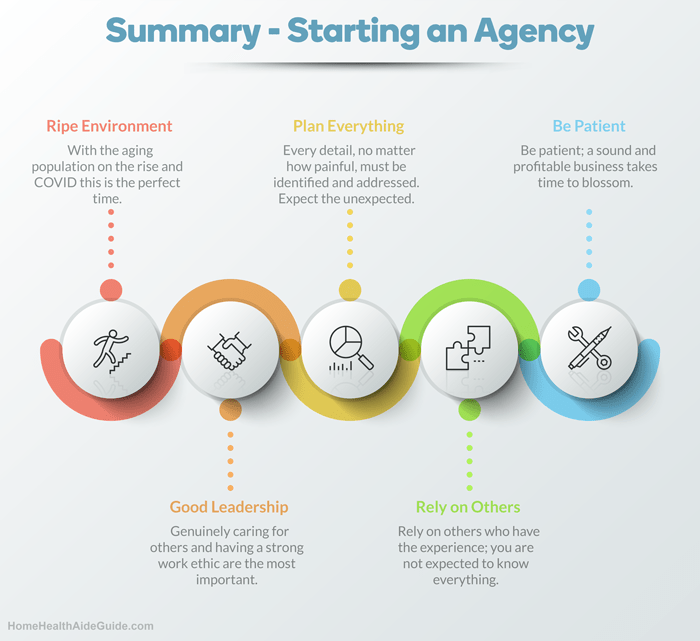
In summary:
- It is a ripe environment to start an agency
- Good leadership and people skills are more imperative than a medical background
- Plan everything and be conservative; expect the unexpected
- Rely on others who have the experience; you are not expected to know everything
- Be patient; this will not blossom overnight
You can do this; others have and now it could be your opportunity.
Resources
State Licensing Contacts For Home Health Agencies


NEW FOR 2024
150+ Policies and Procedures! Customized for FREE with YOUR agency information!
You will need these forms BEFORE you open an agency; avoid very costly mistakes and save thousands of dollars! Access your very own home health care agency policy and procedure manual. Add your logo, name, address etc. all for FREE!
PLUS we just added a new ** Agency Employee Handbook **!
